- Home
- Pierce, Blake
Vengeance in Vienna Page 14
Vengeance in Vienna Read online
Page 14
He frowned. “You aren’t part of the board?”
She shook her head.
He punched the air weakly. “Rats. I thought you were. I was going to have a lot of fun at your expense. Dangle you in the wind for hours and days and weeks, waiting for my response as to whether I’d return. Nothing personal, you see. Just, after their treatment of me, they deserve it, you see.”
Diana nodded. “I understand. I am sure they’ll be asking you back soon. I hear you’re quite a talent.”
“That’s right. I am. Better than that charlatan, that’s for certain, though I hate to speak ill of the dead.” He shook his head. “It’s a shame he’s dead. Don’t get me wrong. I wouldn’t wish death on anyone. But his technique was atrocious. So cold. So clinical and unfeeling. I often thought he must’ve been taught by a computer!”
That sounded similar to what his niece had said at the Opus café. “So you two didn’t get along?”
He snorted. “We’re night and day. But those idiots couldn’t see. Didn’t care. Only cared about ticket sales. So they put the show monkey in front, to bring the crowds,” Gunther said, shaking his head. Then he tilted his head and his eyes met hers. “I’m sure you didn’t come here to discuss my gripes with the Philharmonic, though? And you didn’t come for a lesson? So what are you here for?”
It was rare for Diana to meet someone so friendly to strangers and willing to talk to them. It might have been the Mr. Rogers association, but Gunther Graf had an easy, likable manner about him, a bit like a dotty old grandfather. Still, she knew looks could be deceiving. “Well . . . have the police been to see you?”
He nodded slightly. “Yes. Briefly.”
“Oh.” But maybe there is some information the police might have missed, if they were only here briefly. “I suppose you can say that I’m invested in the murder, since I found the body.”
His eyes widened. “You did?”
“Yes. I attended the last performance and then went in back to get my program signed. That’s when I found him. So naturally, I’m a suspect.”
He waved her in. “Well, that’s interesting. Come in, come in. I want to hear all about it. Would you like some tea?”
“Well, sure, thank you,” she said, following him into a bright home with very high ceilings. In the long hallway, she passed a living room with floor-to-ceiling bookcases, and another room, with nothing but a massive grand piano. The white kitchen at the back of the house was tidy and filled with sun. She peered around at the place, trying to find any detail that might point to him as a murderer. But there wasn’t much. It was a neat, well-appointed home, with likely expensive, antique but understated furnishings. If Graf had a motive, it probably wasn’t financial.
He directed her to sit at a little table and began fussing with the teapot, filling it under the faucet and setting it to boil. A moment later, he had a tray with all the tea fixings, along with little cookies, which suggested he had tea often with others.
“You live here alone?” she asked him.
“Very much so. My wife passed three years ago, bless her soul.”
“Was she a musician, too?”
“Oh, no. But she had an appreciation for it. In fact, we met in Musikverein, years ago, after one of my performances. So you’re American, eh? Been to our Musikverein? What did you think?”
“I loved it. It’s so much more beautiful than what I saw on television. Being there was like a dream,” she gushed. “It must be lovely to play there?”
“Lovely? Oh. You know, the performer is only part of the equation. The music, the accompaniment, play parts, but the locale is crucial. And Musikverein is like . . . like coming home.” His eyes seemed to get wet as he mused about the place. Diana could tell he missed it. “I play my stuff here every day, and eh. It’s missing something. Nothing sounds as good as it does there, in that golden hall. It elevates the music to the heavens. There is nowhere else in the world where I’d rather play.”
She let out a sigh. “It’s such a shame that you can’t.”
He shrugged. The kettle began to whistle. He took it off the stove and poured it into two dainty blue teacups. Diana helped herself to sugar cubes and cream.
“When did you meet Lukas Huber?”
He settled himself into a chair and groaned. “Probably just after that. Arrogant little man.”
“So you didn’t like him from the start?”
He shook his head. “I can’t say I did. You know, he actually accused me of being messy? He’s the one who plays like some robot, with no feeling or emotion at all. Technically, he’s excellent, but there’s no feeling there.”
Hmm. I wonder if that’s why I wasn’t moved to tears. “I think I know what you mean,” she said, sipping her tea. She swallowed and said, “Sounds like it was a bit of a Mozart-Salieri relationship?”
“I wouldn’t say that. First, I am not a composer. Not in the least. Never had those sorts of aspirations—the playing was my gift, my talent, and I pushed it to the greatest extent I could. And secondly, that relationship is built on a lot of conjecture. There’s enough evidence to suggest that the two composers had more of a mutual admiration for one another, rather than an out-and-out, bitter rivalry.”
“Is that so?”
“Hmm. Yes. Salieri taught Mozart’s son. Did you know that?”
“No . . . I didn’t.”
“They may have enjoyed a bit of fun at each other’s expense, and I don’t doubt there was envy, but I think it all stemmed from their appreciation of each other’s talents.” He placed his teacup down and gazed at it sourly. “I had no such admiration for Huber. He was a cheat, a scoundrel, a flake, and a talentless hack, through and through. Jealous? How can one be jealous of a snake?”
Diana’s jaw dropped. She knew he disliked the man, but it was only then that she saw how absolutely disgusted Graf was by him.
He laughed. “In case there should ever be any doubt upon where I stand.”
“My. I see that,” Diana said. She could almost feel the hate radiating off of him.
He leaned forward and rubbed his hands together. “So you must tell me. How was he found?”
“He was lying on the floor of his dressing room. I accidentally stepped on his hand when I went in. I believe he’d been strangled by his neck-tie.”
“Ah. Interesting.” For someone who didn’t want the man dead, he certainly had a lot of interest. “But not exactly unanticipated. He lived his life wildly. All those women, all those insults he hurled about. Arrogant piss-ant. I always knew he’d piss off the wrong person one day.”
“I guess he did. Do you have any idea who could’ve done it?”
He shrugged. “Probably one of the husbands of the women he wooed, or some sort of thing,” he said, pushing a plate of star-shaped shortbread over to her. “He didn’t care much for the institution of marriage, I could tell. Have a cookie. I bake them myself.”
She took one and nibbled it. “Were you there, the night of the performance?”
He scoffed. “Me? No. I’d be sooner entertained by a cup of nails, rattling around in a clothes dryer. His own composition. Ha! He stole a good part of it from Liszt.”
Diana’s ears perked up. “So you heard it before?” she asked, confused. Hadn’t she read that that was the first time it was being performed?
“No. I didn’t need to. He steals everything from Liszt. Twists it around and makes it sound slightly different, but a musician’s ear can untwist it.” He eyed her carefully. “Oh, Dear. I know what you’re thinking. And you are barking up the wrong tree, I’m afraid. The thing is, everyone in that hall—every worker, usher, ticket-taker, and musician—knows me. There’s no way I could’ve been anywhere near that hall without someone recognizing me.”
She nodded, as she was just coming to the same conclusion herself. He was a larger man, someone people would notice. Plus, he was older, and a bit slower, too. He didn’t exactly seem like the type to be sneaky or underhanded at all. “I see.”
She tittered. “Oh, no, I wasn’t doing that. But I was interested in knowing your interpretation—as a piano virtuoso—of his music.”
“Trash. It’s well-known. The good parts are Liszt. And then the bits of original composition he adds are simply fluff. Terrible.” He chewed on a cookie, shortbread crumbs catching in his white beard. “It pains me to see the hallowed halls of the great place tainted by his output. I don’t understand in the least why he wasn’t laughed off the stage for it.”
“It was all right,” Diana said.
“All right? My condolences to your ears.” He laughed. “But I suppose it was my outright abhorrence of his work that wound up getting me sacked.”
“Is that right?”
He nodded. “Oh, he was always going to be their principal player. I think he might’ve wooed a couple of the women on the board, and he was the talk of Vienna. But they might have kept me on to fill in for him, if necessary, had I not been so outspoken about my hate for him.” He shrugged. “I couldn’t help it. I suppose that’s why the police came knocking on my door, like you. But besides agreeing that I’d have been recognized if I went near the place, I was also out of town last night, in Hallstatt, visiting friends. I gave their names to the police, but I’m more than happy to give them to you, as well, if you’d like to check?”
She wiped her mouth with her napkin and shook her head. She believed him. “That’s not necessary. So . . . do you think you will go back to the Vienna Philharmonic, if they ask you?”
“No,” he said, to her surprise.
“Really?”
He shrugged. “What can I say. I’m an older man, and as much as I love to play, the rigors of the Philharmonic were exhausting. Performing Mozart takes a lot out of you. I enjoy teaching little children how to play much more. They come to my house and their smiles are bright and they love to learn. And I have grandchildren now, too! Yes, I suppose you can say I’m happy with the life I have now, and I’ve made my peace with Lukas Huber, God rest his soul.”
“Oh. That’s great. I am glad to hear it.” Diana forced a smile, even though inside, her hopes were plummeting. If Gunther Graf wasn’t a suspect . . . that brought her right to square one. Again.
She stood up and checked her phone. “Thank you, but I have to be going. I would’ve loved to hear you play.”
“Well, my door is always open, Miss . . .” he frowned. “I didn’t get your name?”
“Diana,” she said, shaking his head. “Diana St. James. It’s very nice to meet you.”
“Likewise. Please, do stop in, whenever you would like. I’d love to play for you.”
She smiled as she left, wishing she could take him up on that offer. Maybe the lack of emotion in Huber’s playing was what had stunted her before.
But now, she felt like she was running out of time. The police were already ahead of her, and if they didn’t find any other suspects, the target would wind up, drilled right into her back. She had to think. Who else could have done this?
CHAPTER TWENTY
As Diana wandered back toward the hotel, she came to the columned building she’d seen earlier. Checking her map, she realized it was the Austrian parliament building. The statue in front of it was Pallas Athene, a several-meters-tall representation of the goddess, adorned in a golden wreath. Several other real and mythological figures sat at her feet, but it was the majestic and graceful goddess that Diana stared at, now.
“You are the goddess of wisdom. I’d certainly like some of that now. What should I do?” she asked.
Similar to Brahms and Mozart, she wasn’t saying much.
I really do need to stop talking to these statues before Moser comes and carts me off to the looney bin.
Diana walked to a bench and sat down, gazing at it. The sun was setting behind it, giving it an otherworldly aura. All day had been spent running around, looking for clues to Huber’s murder, but she’d made little headway. She hadn’t even really seen much of the city’s landmarks. The day had been a bust.
The only thing she did know was that her feet hurt. It probably wasn’t a good idea to attempt a walk back to the hotel. She needed to hail a cab.
Grabbing her phone, she looked at the display, thinking she’d see more messages from the family. But other than a few push notifications for her different apps—a blowout sale on rugs at the local department store, Breaking News of something the governor did back in New York— there was nothing.
She stared at it, wondering if her phone was even working. What happened to them? Are my messages going through?
She went to her “settings” panel and toggled in and out of Airplane Mode, then went to her other messages, to make sure she hadn’t missed anything.
But there was nothing.
Remembering back to her conversation with Bea, she wondered if that was the reason. By now, Bea had probably told Evan and Lily about how she’d gone off the deep end and jumped down Bea’s throat. They were all probably scared to contact her, considering how she’d cut all of them off. Lily had probably told them about the murder, by now, too. Now, they’d all decided to give up on her, to leave her to deal with her own situation . . . just like she’d told all of them to do.
She missed them. And of course, now, when she really wanted someone to talk to, she was alone.
Diana’s back straightened against the wooden bench. Near Pallas Athene, a man with an accordion was playing, a slow, mournful song. It was sad, but by now, Diana knew it wouldn’t move her to tears. Maybe nothing ever would, again.
The thought irritated her. It was her own fault, wanting more out of this trip then just some tourist traps that anyone could see. She wanted things that might have been truly impossible. Falling in love in Italy? No, that hadn’t happened, but she’d fallen in love with Italy. She’d told herself that was good enough.
But was it? Had she gone past that part of her life, where falling in love mattered? And would she be satisfied, just hearing beautiful music that didn’t move her to tears? Was she so closed off now, so jaded, that things didn’t impress upon her that way?
Maybe. Maybe she should have just accepted that she couldn’t have what she wanted. It should have been easy. After all, a million years ago, she’d been in love with Stephane, that gorgeous Frenchman. And it’d fallen apart, leaving her to marry Evan.
Her life had been all about changed plans, about making do with not-quite-perfect.
Maybe she should’ve just accepted that some things were impossible.
Feeling especially low, she went to the curb and hailed a cab. As she slid into the back and directed the driver to take her back to the Hotel Beethoven, she looked out and wondered if the same held true for this murder. Maybe her trying to solve it was impossible. Maybe she should just let the police do their work and come to their own conclusions, and hope that that conclusion didn’t point to her as the killer.
When the cab pulled up to the front of the hotel, she paid the driver and stepped out, wondering what to do for dinner. There was a little restaurant downstairs, on the corner, she thought, scanning the area to find it. Or maybe better yet, room service. The last thing I want to do is go somewhere and run into Hans.
Actually, sadly, she’d have liked to talk to Hans, at that moment. At least he wouldn’t have been questioning her about the murder.
As she scanned the area, her eyes landed on a man, standing behind a potted bush at the entrance. There was no mistaking him, even through all that foliage. Ugbodu. Perhaps he was trying to be inconspicuous, but a dark-skinned man of African descent didn’t exactly do inconspicuous in a place like Austria. Was he . . . following her?
Of course he is, Diana. You’ve been directly associated with three murders in Europe so far. What do you expect?
The second he noticed her watching, he quickly lowered his sunglasses and pretended to be very interested in the brochure he was holding.
She waved at him.
He turned away and started briskly walking up the block, disappearing around a corner.
Well, that settles it, then. Room service.
She stepped into the small lobby, shoulders slumped. Here, she should’ve been enjoying Vienna for all it was worth, and now, once more, she was relegated to a hotel room, and room service, to avoid the prying eyes of the police. As she walked toward the reception desk, she felt like the staff was looking at her, like they thought she was guilty, too. Maybe somehow everyone knew?
She jabbed on the elevator button and when it opened, and was empty, she sighed with relief as she scuttled in.
The first thing she saw when the doors closed was a framed picture of Musikverein.
She stared at it closely. Oh, hello. Why did I never notice you before?
Though the subject of bad memories, the place still made her pulse skitter with delight. It had such a history that one bad thing, even a murder, couldn’t erase it. And Gunther Graf had spoken with such love about the place and the music he’d made there. She felt love, herself, for it, and she wasn’t a musician. She could only imagine how close to the place the actual performers were. They must’ve—
Suddenly, she stopped, as a thought hit her, right between the eyes.
The elevator dinged, and the doors began to open.
But instead of going out, she jabbed the door closed button hard, and pressed the button for the lobby. Why hadn’t she thought of it before? She couldn’t go to her room just yet. Not until she checked something out.
As soon as the doors slid open, she exploded out into the lobby, and came face to face with . . . Marius Ugbodu.
“Oh!” she breathed in surprise, then realized she was stepping on his toes. She backed away as if her feet had been on hot coals.
He stared at her, stone-faced. “Where are you going?”
“Just to get some fresh air, you know?” she said, pointing for the doors. “What are you doing here?”
“This is my hotel,” he said.

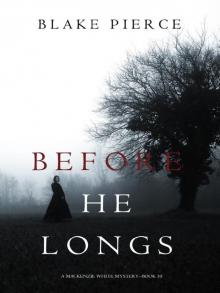 Mackenzie White 10-Before He Longs
Mackenzie White 10-Before He Longs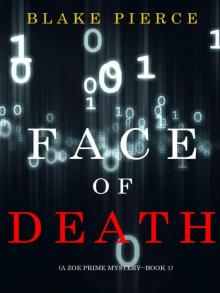 Zoe Prime Mystery 01-Face of Death
Zoe Prime Mystery 01-Face of Death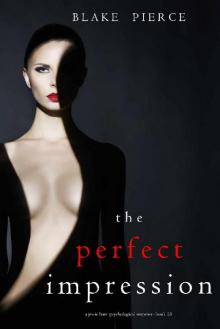 The Perfect Impression
The Perfect Impression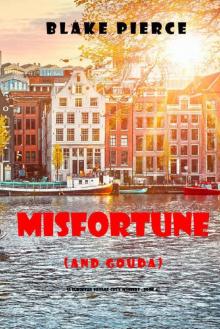 Misfortune (and Gouda)
Misfortune (and Gouda) Vengeance in Vienna
Vengeance in Vienna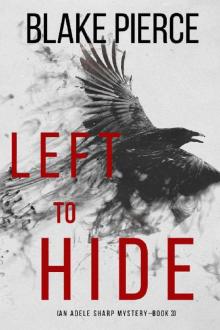 Left To Hide
Left To Hide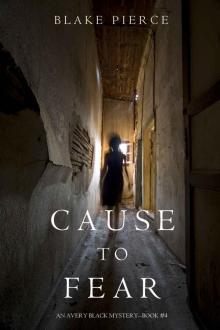 Cause to Fear
Cause to Fear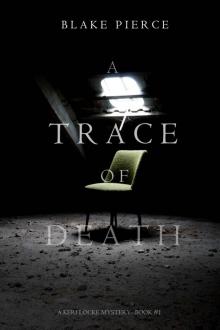 A Trace of Death (A Keri Locke Mystery--Book #1)
A Trace of Death (A Keri Locke Mystery--Book #1)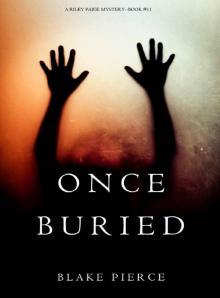 Riley Paige 11-Once Buried
Riley Paige 11-Once Buried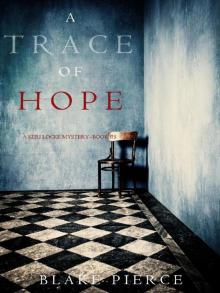 Keri Locke 05-A Trace of Hope
Keri Locke 05-A Trace of Hope